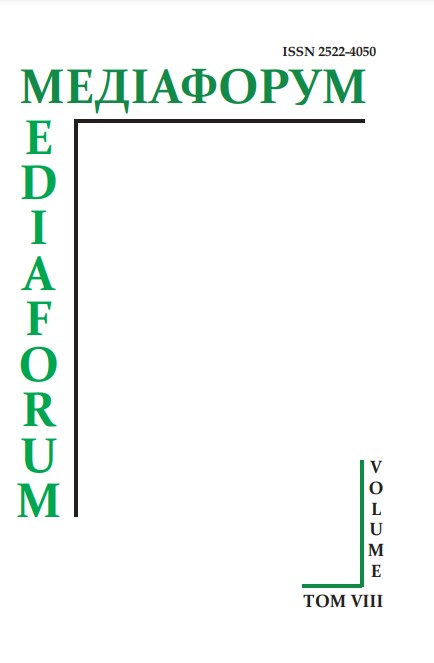Moral and Political Crisis of Intersubjectivity in Europe and Ukraine: Implementation of Deliberative Democracy Idea
DOI:
https://doi.org/10.31861/mediaforum.2020.8.115-131Keywords:
virtualization, digitalization, intersubjectivity, deliberative democracy, communicative-network transformationAbstract
The article explores formation of new ideals and values that has become a key task of the European community after overcoming totalitarianism. Many researchers of that time were looking for methods to prevent atomization and establish democracy, and one of the methods was communicative philosophy. This approach helped to shape the main narratives that still shape the politics of Western Europe. However, Brexit, the international economic crisis of 2008-2011, the COVID-19 pandemic are Black Swans that each time set the tone for the mood of society and determine the meanings of narratives on social networks (virtual and real).
The communicative-network transformation of society is capable of materializing the discourse around new problems of the world in order to prevent a moral split. The virtual dimension of our everyday life acquires key roles in the dissemination of thoughts and shaping the mood of society. This transformation creates new threats to liberal values that were formed long before the “state in the smartphone”. Focusing attention on the modern conditions of human life will help to better understand its political behavior and ways to create better conditions for democracy in modern society.
Downloads
References
Anderson R. D. (2003). Dyskursyvne pokhodzhennia dyktatury i demokratii. Universum. 2003. № 7–10. https://goo.gl/zk8FdF (data zvernennia: 07.09.2020).
Halushko K.Iu. Suchasnyi ukrainskyi grand-naratyv: pidkhody, kontseptsii, realizatsiia. Ukrainskyi istorychnyi zhurnal. 2013. №1. C. 5–6.
Horenko O.M. Ukrainskyi metanartyv v epokhu propagandy. Ukrainskyi istorychnyi zhurnal. 2014. №2. URL: https://goo.gl/ZkmwPW (data zvernennia: 21.08.2020).
Dovira do sotsialnykh instytutsii ta hrup. URL: https://goo.gl/nmafJr (data zvernennia: 07.09.2020).
Karas A. F. Svoboda i vidpovidalnist yak problema samozdiisnennia osoby. Visnyk Lvivskoho universytetu. Seriia filosofski nauky. 2016. № 18. S. 13-28.
Luchak A.-M.M. Deliberatyvna demokratiia yak forma pravlinnia v informatsiinomu suspilstvi. Filosofiia yak kulturna polityka suchasnosti: tezy dopovidei III vseukr. nauk. konf. (m. Ostroh, 14–15 zhovt. 2015 r.). Ostroh: Vyd-vo Nats. un-tu «Ostrozka akademiia». 2015. S. 62–65.
Luchak A.-M.M. Elektronne vriaduvannia yak shliakh utverdzhennia tsinnostei deliberatyvnoi demokratii. Filosofiia dialohu y porozuminnia v pobudovi yevropeiskoi i svitovoi spilnot: tezy mizhnar. konf. (m. Lviv, 22–24 cherv. 2016 r.). Lviv: VTs filosof. f-tu LNU im. Ivana Franka, 2016. S. 147–149.
Luchak A.-M.M. Svoboda samovyznachennia yak umova konstruiuvannia yevropeiskoi identychnosti ukraintsia. Naukovi zapysky Natsionalnoho universytetu “Ostrozka akademiia”. Seriia “Kulturolohiia”. 2015. Vyp. 16. S. 326–329.
Masuda Y. Kompiutopiia. Filosofska i sotsiolohichna dumka. Kyiv, 1993. S. 36-50.
Taleb, N. N. Antykhrupkost: kak yzvlech vyhodu yz khaosa / per. s anhl. N. Karaev. Moskva, 2016. 768 s.
Uiavlennia pro te, shcho oznachaie buty hromadianynom. Sotsiolohichne opytuvannia Tsentru Razumkova. URL: https://goo.gl/Y75PqH (data zvernennia: 12.08.2020).
Fukuiama F. Suspilstvo v Ukraini mozhe staty natkhnenniam dlia inshykh krain. Paltforma. 2016. URL: https://goo.gl/kjxT9U (data zvernennia: 12.08.2020).
Khabermas Yu. Vovlechenye druhoho. Ocherky polytycheskoi teoryy. Sankt-Peterburh, 2001. 417 s.
Khabermas Yu. Problema lehytymatsyy pozdneho kapytalyzma. Moskva, 2010. 264 c.
Chomu Vy ne zalucheni do hromadskoi diialnosti? Sotsiolohichne opytuvannia Tsentru Razumkova. 2008. URL: https://goo.gl/Uh3WH8 (data zvernennia: 21.08.2020).
Shcho zavazhaie Vashii hromadskii aktyvnosti? Sotsiolohichne opytuvannia Tsentru Razumkova. 2008. URL: https://goo.gl/1cu2D8 (data zvernennia: 21.08.2020).
Declaration of Principles. Building the Information Society: a global challenge in the new Millennium. URL: https://goo.gl/p17fdB (data zvernennia: 21.08.2020).
Habermas J. The theory of communicative action. Boston, 1984. 457 p.
Luchak A.-M. Network and Communicative Transformation of Civil Society: Ukrainian Context. Virtus. 2016. №10. P. 24-29.
Lutsevych O. How to Finish a Revolution: Civil Society and Democracy in Georgia, Moldova and Ukraine. Chatam House. URL: https://goo.gl/AEpQLc (data zvernennia: 11.07.2020).















